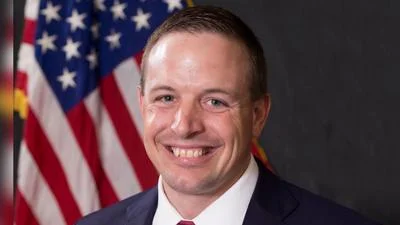Froedtert West Bend Hospital issued the following announcement on November 8.
The struggle that came with activities, like a short walk, was not what she expected when the journey started.
Continuing Coverage: COVID-19 in Wisconsin
Advertisement
"(A) simple trip to the mailbox would become overwhelming," said Cynthia, who asked to only use her first name.
A drastic change from life's usual pace.
"I'm part of an adult Irish dance company," she said. "We would have shows constantly. Every few weeks throughout the month and then you would practice a few times a week, so, I was constantly active almost every day. "
Her active life changed in the fall of 2020.
"I was just a young, healthy, 26-year-old who used to Irish dance for fun and work hard at my career," she said.
Cynthia is a registered nurse whose own health took a turn when COVID-19 set in.
"When I got it in October of 2020, my initial two weeks were as expected. I couldn't smell or taste. It just felt like a really bad cold," she said.
She thought she would be back to work after a couple of weeks, but after 14 days, she said she felt worse and realized something was wrong.
There were trips to the emergency room over the first three months because she said it "went from feeling like a normal common cold to suddenly feeling like you can't breathe. The cough wouldn't go away and as that started to resolve a few months later, I had this overwhelming chest pain that could not go away."
She said it persevered 24 hours a day, got worse with activities like moving around the house and she was briefly hospitalized, at one point.
"I was completely healthy before this, so, I had no other issues and then suddenly I get COVID and I have all these issues," she said.
Cynthia is a long-haul COVID-19 patient.
She's among those living with post-COVID-19 symptoms months later.
Cynthia said her biggest barrier is chest pain that "never goes away."
She added, "it's just there all the time and it's a matter of moderate, severe or mild."
According to the Centers for Disease Control and Prevention website: "Post-COVID conditions are a wide range of new, returning, or ongoing health problems people can experience four or more weeks after first being infected with the virus that causes COVID-19."
The CDC lists nearly 20 common symptoms, including breathing issues, fatigue and "brain fog" (difficulty thinking or concentrating).
"Even people who did not have COVID-19 symptoms in the days or weeks after they were infected can have post-COVID conditions. These conditions can present as different types and combinations of health problems for different lengths of time," the website states.
A recent study found more than one-third of people had at least one symptom, 3 to 6 months after their COVID-19 infection.
Two hospital systems in the Milwaukee area, Froedtert and the Medical College of Wisconsin, and Ascension Wisconsin, have programs specific to the treatment of post-COVID-19 patients.
An Ascension Wisconsin spokesperson said the health system opened its first location in Oak Creek in November 2020.
To meet growing demand, Ascension Wisconsin opened two more clinics in Milwaukee and Racine.
The spokesperson said more than 525 patients were seen and treated through July 2021 (the latest data available).
"We really can't predict who is going to resolve the infection pretty quickly and the people who are going to continue to have symptoms," said Dr. Julie Biller, a pulmonologist and director of the Froedtert and the MCW Post COVID-19 Care Program. "One of the thoughts for the long COVID or people who have non-resolving symptoms, is that there is some continued inflammation going on in the body. And we think a lot of this is keyed into the autonomic nervous system," Biller said.
At the Froedtert and the Medical College of Wisconsin program, patients are referred by providers.
Specialists in a number of areas — pulmonary, psychiatry, endocrine, hematology, cardiology, physical medicine and rehabilitation, neurology, and ear, nose and throat — work with patients who have persistent medical issues in the months following their COVID-19 infection.
Biller said they're seeing several common symptoms such as fatigue, persistent cough, chest pain, shortness of breath and brain fog.
Since the program started in January, Biller said they've seen more than 500 patients.
According to Froedtert and the Medical College of Wisconsin, 39% of the patients seen in the program are between the ages of 18 and 44, and 42% are 45-64 years old.
"The various specialists follow the patients until they either have resolution of their symptoms or are on a stable treatment program," Biller said. "For some people, it may be long-standing care within certain specialties for quite a long time. We don't know yet."
Cynthia was one of the first patients at the Froedtert and the Medical College of Wisconsin program, where she's been treated for about 10 months.
Biller is one of Cynthia's doctors as she recovers.
Cynthia meets with specialties in pulmonology, cardiology and other areas, and she said she is now taking medication that she wasn't on before the COVID-19 infection.
"So, I've come a long way," she said. "I can do about a 20-minute walk or low impact exercises like aerobic exercises."
Cynthia is making progress, but there is still more to be done to get back to full recovery.
"I can tolerate part-time at work as a registered nurse. We're very on the go, constantly. Moving around in the environment I'm in. So, that was a huge challenge for me," she said. "I actually went through physical therapy to get me essentially from being in a bed-bound state to be able to tolerate work."
Cynthia said there are theories about what happened to her.
"They think initially I had something called Pericarditis which is inflammation in the lining of the heart," she said. "So, a lot of my symptoms are related to that. However, Pericarditis doesn't typically last this long. Since my diagnosis, we're kind of at the point now where we're looking into other options like rheumatology and electrophysiology and other specialties."
Long-haul COVID-19 brings a lot of unknowns.
Added to that list in Cynthia's case, she has an identical twin sister.
"And we both got COVID at the same time," she said. "She is completely normal. So, it just goes to show even with two people that are the closest in genetics that you can possibly have, this is truly an unpredictable condition."
In September, the U.S. National Institutes of Health announced a $470 million grant for studies, to get a better understanding of long-haul COVID-19.
Cynthia is part of three studies, meaning her situation could help answer some questions about long COVID-19.
"I know from other groups that I've talked to, long haul COVID groups, that a lot of people don't feel like they're heard and that they're not believed," Cythnia said. "Part of the reason why I'm sharing my story is because I want people to know that this is something that's real. It's affecting people's lives for a very long time."
Long-haul COVID-19 has led Cynthia to reevaluate life and what's important.
"I truly believe if I was older or sicker for whatever reason, I may have been one of those people that might have passed away. To have me even reach to here and find this new inner peace it really just brings your life into a whole new perspective," she said.
One year in and her life is still affected by long-haul COVID-19.
She is determined to get back what COVID-19 took away.
"Eventually I really would love to do the things I used to do, like Irish dance, which is pretty tough to do," she said.
Original source can be found here.



 Alerts Sign-up
Alerts Sign-up